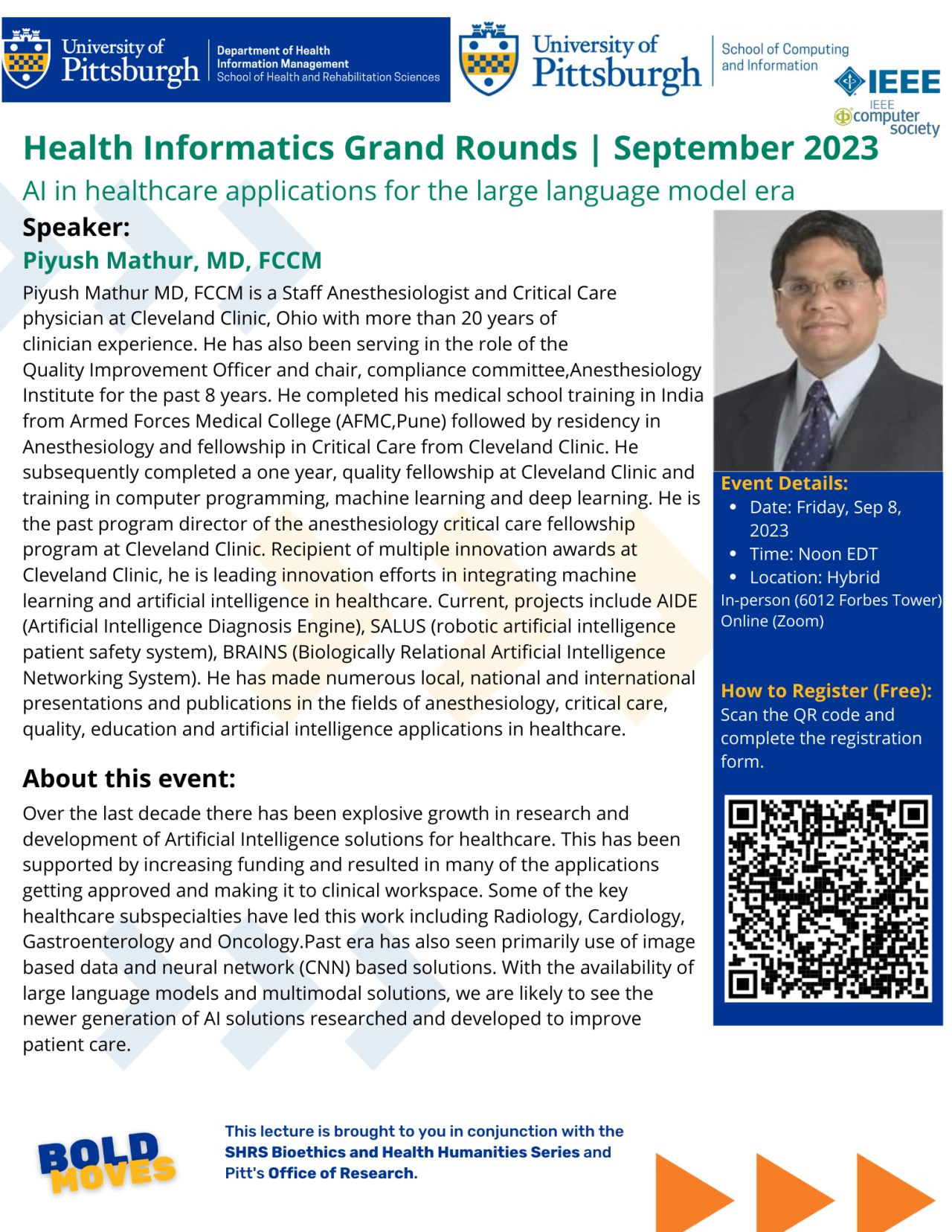AI Helps Improve Healthcare Staff’s Mental Health, Promises Better Triage for Future Viral Outbreak Response, and Predicts Pregnancy Risks for Women 🤖
Weekly Updates on AI in Medicine 🤖🩺🚀
“Eventually, doctors will adopt AI and algorithms as their work partners. This levelling of the medical knowledge landscape will ultimately lead to a new premium: to find and train doctors who have the highest level of emotional intelligence.” ― Eric Topol
Dear Med AI Enthusiast,
Welcome to this edition of ‘The Med AI Capsule’ Weekly Newsletter! ⚕️🤖💊 I'm really excited to have you with me as we dive into the fascinating world of Medical AI.
In this newsletter, I'll be your guide, taking you through the latest news updates and thought-provoking ideas in the ever-changing field of artificial intelligence in medicine.
Whether you're an interested medical professional, a tech enthusiast, or just curious about the future of medicine, 'The Med AI Capsule' is here to lead the way and show you the exciting possibilities and cautionary areas for AI in medicine.
So, get ready for an adventure, and let's explore this thrilling journey together!
In today’s capsule:
AI App Improves Mental Health for Healthcare Staff
AI Platform Predicts and Aids Future Viral Outbreaks
AI Predicts Pregnancy Risks for Women
Other 3 Med AI News
1 Med AI Event
1 Med AI Work Opportunity
simplifAI - Making 1 AI Terminology/ Concept Simple for Everyone - AI vs ML vs DL
Social Post of the Week
1 Fun Fact
Reading Time: 7 minutes
QUICK HITS/ LINKS: (Scroll down for deep dive)
Healthcare staff report improved mental health upon using Wysa AI app
AI-Powered Triage Platform Could Aid Future Viral Outbreak Response
QuantHealth brings its AI-informed clinical drug trials to the US with $15M round
Artificial intelligence may influence whether you can get pain medication
Revolutionary’ AI implant to be game changer for chronic illnesses
AI App Improves Mental Health for Healthcare Staff 🧑⚕

A 12-week trial by researchers at two NHS trusts in the UK tested the AI mental health app Wysa with 350 healthcare staff. The app provides conversational therapy, mood tracking, mindfulness and sleep tools powered by AI. The trial showed the app improved mood, sleep, motivation and overall wellbeing among the staff facing burnout and considering quitting.
Why is it important?
Demonstrates potential for AI chatbot apps to provide accessible mental health support at scale.
Validates digital mental health tools as an important well-being resource for healthcare workers facing rising stress.
NHS staff mental health support is critical to retain talent and prevent burnout.
Shows promise for regulated digital therapeutics in mental healthcare.
“Our staff appreciated this opportunity to trial the free digital wellbeing app and to share their feedback – the sleep support pack was popular and well recommended by our staff.” - Katie Bedford, Business Support Officer at Northamptonshire Healthcare NHS Foundation Trust
Caution:
While the initial results are promising, larger clinical trials are still needed to validate the app's effectiveness. There are also ethical considerations around user data privacy that must be addressed responsibly. The app should act as a supplement to, not a replacement for, professional counselling. Careful integration with broader mental health resources is also required, along with further regulatory approval before medical claims can be made.
AI Platform Predicts and Aids Future Viral Outbreaks 😷

Researchers at Yale University and global partners have developed an AI triage platform that uses machine learning and metabolomics to predict disease severity and hospitalization length during viral outbreaks. Tested on COVID-19 data, it identified unique biomarkers and created software for personalized outbreak response.
Why is it important?
Combines clinical data, history and plasma metabolites to estimate hospitalization within 5 days.
Predicts ICU needs to optimize resource allocation and improve patient outcomes.
Provides a data-driven approach to aid future viral outbreak response.
Lays groundwork for personalized, predictive patient management.
Helps overwhelmed health systems effectively triage patients.
"Being able to predict which patients can be sent home and those possibly needing intensive care unit admission is critical for health officials seeking to optimize patient health outcomes and use hospital resources most efficiently during an outbreak.” - Professor Vasilis Vasiliou, Yale School of Public Health
Caution:
The AI triage tool, initially promising, necessitates further validation beyond its initial COVID-19 testing, given the data's early pandemic origin, the demographic disparities in the control group, and the ethical concerns surrounding patient data handling. Integration into clinical workflows demands careful consideration. Responsible design and rigorous research are imperative for harnessing its potential benefits and mitigating associated risks in real-world outbreak scenarios.
AI Predicts Pregnancy Risks for Women 👩

Researchers at the University of Nairobi are using AI and gene sequencing to analyze the vaginal microbiome and its links to pregnancy risks for women in Africa. The 5-year project screens 1,500 women to identify microbial signatures tied to preterm birth, stillbirth and other adverse outcomes. The goal is to enable faster testing and treatment to reduce pregnancy complications and maternal mortality.
Why is it important?
Africa has high neonatal mortality, but limited data on causes.
Vaginal infections are dangerously underdiagnosed and can severely impact pregnancy.
Project is pioneering research on the vaginal microbiome in Africa.
Aims to develop predictive tools to identify at-risk pregnancies early.
Could inform faster tests and better treatments to improve outcomes.
“Early identification and treatment of vaginal infections would reduce the scale of adverse pregnancy outcomes." - Prof. Moses Obimbo Madadi, University of Nairobi
Caution:
While promising, the research requires responsible development and testing before clinical use. The research is still in the early stages, and predictive tools remain unproven. Turning microbiome data into clinical practice will take time. Computational models will require extensive validation. If successful, it could provide invaluable insights to guide women's reproductive health in the region. But prudent evaluation is critical first.
Other Med AI News:
AI-powered clinical trial optimization startup QuantHealth has raised $15M to expand its platform, which leverages extensive patient datasets and simulations to predict trial outcomes, to the US market.
The company claims its technology can optimize trial design to improve success rates, reduce costs, and accelerate development timelines.
However, thorough validation and responsible use of patient data will be critical as QuantHealth scales up.
Tools like Narx Scores generated by proprietary AI algorithms are being widely adopted by states, healthcare systems and law enforcement to guide physician opioid prescribing and identify high-risk patients and providers.
However, concerns about transparency and independent validation have arisen, raising worries about potential denial of pain treatment and unjust targeting of doctors.
Calls for increased oversight and transparency to prevent overcorrection and ensure equitable outcomes and access to medical care are growing. Further evaluation is essential to validate AI's impartiality and real-world impact in this critical public health context.
Researchers from MIT and the University of Galway have created a breakthrough "one-size-fits-all" medical implant that utilizes AI and soft robotics to customize drug delivery for treating chronic illnesses.
The intelligent implant adapts its shape to prevent rejection and administers drugs based on inflammation and individual immune responses.
The researchers believe this technology could significantly improve treatments for diabetes and other chronic diseases by preventing implant rejection and minimizing side effects through personalized, AI-optimized drug delivery tailored to each patient. However, further research and development are still needed to validate safety and effectiveness before clinical implementation.
MED AI EVENT
MED AI WORK OPPORTUNITY
simplifAI - Making 1 AI Terminology/ Concept Simple for Everyone
AI vs ML vs DL
Image Credit: Wikimedia Commons
AI is the big circle that includes everything. AI is software that can learn to be intelligent on its own.
Machine Learning is inside the AI circle. It's when software improves at a medical task by analyzing data, like detecting illness from EHR data.
Deep Learning is inside Machine Learning. It uses special brain-like networks to become an expert at medical skills, like detecting illness from X-rays, after practising with many images.
So Deep Learning is part of Machine Learning, which is part of the bigger AI circle.
SOCIAL POST OF THE WEEK
Let’s wrap it up with a historical fun fact!
Leonardo da Vinci produced basic designs for a humanoid robot, fashioned like a knight, around 1495. (Reference)
Stay tuned for our upcoming editions as we explore the latest breakthroughs and dive deep into AI's transformative power, shaping a healthier future.
Warm regards,
P.S.: If you're a medical professional intrigued by artificial intelligence or willing to embark upon your online personal branding journey, but not sure where to start, feel free to reach out to me for personalised guidance HERE.
You can also check out my CPD-accredited Med AI course on the Bionabu (UK) platform and join our vibrant Med AI WhatsApp Community.
Follow me on LinkedIn and Twitter
Voluntary Disclosure: Generative AI tools like ChatGPT (OpenAI) and Claude (Anthropic) were employed to help me in the creation of this newsletter.








